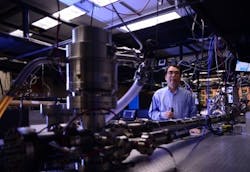UCF researcher gets $6.9 million DARPA grant to create higher-energy attosecond pulses
Orlando, FL--The University of Central Florida (UCF) researcher who last year led an effort that generated a 67-attosecond (as) pulse of extreme ultraviolet (EUV) light has received a $6.9 million grant from the U.S. Defense Advanced Research Projects Agency (DARPA) to make those pulses 1000 times stronger.
Zenghu Chang, from the UCF's Department of Physics and the College of Optics and Photonics (CREOL), is leading a team of researchers from the University of Ottawa (Paul Corkum) and the University of California, Berkeley (Steve Leone and Dan Neumark) to help DARPA better understand the interaction of electrons in solids and, ultimately, create ultrafast sensors and detectors.
Chang said the funding builds from the 67-as pulses of EUV laser light that his team at UCF generated last summer. DARPA's program in ultrafast laser science and engineering (PULSE) will investigate whether attosecond pulses of laser light can be applied to building faster electronic devices.
Strong enough to both excite and probe
Attosecond laser pulses can help scientists understand how energy can be harnessed to transport data or build stronger and more conductive materials. However, the intensity of the previous attosecond light was too low for many applications. Consequently, a strong femtosecond laser has to work together with an attosecond pulse in experiments. The new attosecond light source to be built will be strong enough to both excite and probe electron dynamics, considered to be the "Holy Grail" of attosecond science.
The first stage of the project will focus in building a new femtosecond laser capable of producing higher energy, pulses to drive the process of attosecond pulse generation. The laser will be housed in a 2400-sq-ft space; even so; the laser beam will have to be folded multiple times to achieve the power the DARPA project is seeking, says Chang.
UCF is buttressing its strength in the area of ultrafast lasers and has recently announced the creation of an Institute for the Frontier of Attosecond Science and Technology (FAST), directed by Chang, which will allow researchers from the Department of Physics and UCF’s College of Optics & Photonics/Center for Research and Education in Optics and Lasers to work closely together to compete for cutting-edge projects such as the DARPA grant.
Source: https://today.ucf.edu/ucf-attosecond-laser-expert-captures-6-9-million-darpa-pulse-grant/

John Wallace | Senior Technical Editor (1998-2022)
John Wallace was with Laser Focus World for nearly 25 years, retiring in late June 2022. He obtained a bachelor's degree in mechanical engineering and physics at Rutgers University and a master's in optical engineering at the University of Rochester. Before becoming an editor, John worked as an engineer at RCA, Exxon, Eastman Kodak, and GCA Corporation.
